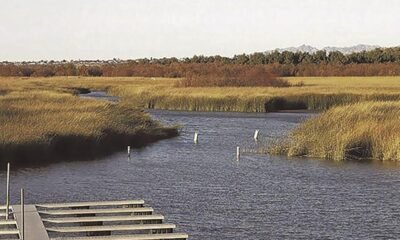Ag-to-Urban
‘Ag-to-Urban’ Legislation Passes, Unlocking Innovative Water Strategy

Arizona legislators have passed a significant bill aimed at tackling two pressing issues: groundwater conservation and housing development. This legislation, approved by the House on June 23, now awaits final approval from Governor Katie Hobbs.
Senate Bill 1611, sponsored by Sen. T.J. Shope, R-Coolidge, permits farmers to sell agricultural land along with associated water rights to developers. The goal is to increase the state’s housing supply by transitioning farmland to residential use, based on the premise that single-family homes use less water than agricultural fields.
Dubbed the “Ag-to-Urban” initiative, this measure was introduced alongside a similar proposal in the House by Rep. Gail Griffin, R-Hereford. Shope referred to it as the most impactful groundwater legislation since the Groundwater Management Act of 1980, highlighting its potential benefits.
The bill mainly affects regions in Maricopa and Pinal counties, particularly Queen Creek and Buckeye, where housing development has faced restrictions due to groundwater scarcity. If state regulators impose a moratorium on new water certificates, Pima County could also see benefits from this legislation.
Nick Ponder, senior vice president for governmental affairs at HighGround, Inc., emphasized that the measure could alleviate existing pressures on housing development in the West and Southeast Valleys by making assured water supply certificates more attainable.
Republican Senate staff have noted that there are 425,232 acres of irrigated farmland eligible for the Ag-to-Urban program in the Phoenix, Pinal, and Pima Active Management Areas. Converting even half of this land could potentially generate over a million new homes, as developments generally average five homes per acre.
This is not the first time the bill has been introduced. A similar version faced veto last year by Hobbs, who cited insufficient data from the state’s initial Active Management Areas. After additional negotiations this year with stakeholders, it gained bipartisan approval in the Senate.
Senate Minority Leader Priya Sundareshan, D-Tucson, praised the bill, calling it a significant advancement in balancing urban development with water security. However, both Democrats and Republicans voiced concerns during the house discussions.
Opponents highlighted potential risks to groundwater replenishment and the Colorado River water supply, fearing the implications of increased housing on these critical resources. Rep. Chris Mathis, D-Tucson, expressed serious concerns about the additional burden this legislation could impose.
Similarly, Rep. Sarah Liguori, D-Phoenix, raised questions regarding the impact on water resources but acknowledged the potential benefits. She urged caution, noting the Legislature’s struggle to pass meaningful groundwater management bills this session.
Despite these reservations, Rep. Stacey Travers, D-Phoenix, recognized the substantial advantages the legislation could offer if executed effectively, stressing the importance of collaboration to address any future concerns.


















